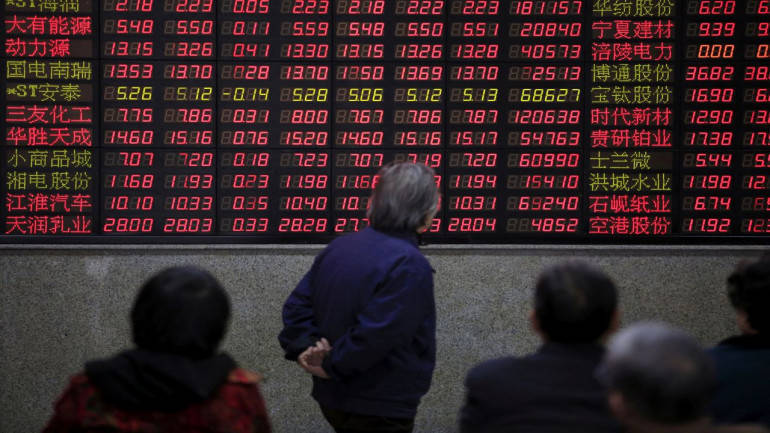
Shares in Asia were mostly higher in Friday morning trade following overnight gains on Wall Street as investors stateside cheered strong earnings and economic data.
The Nikkei 225 in Japan added 1.06% in afternoon trade, while the Topix index rose 1.21% as most sectors gained. Shares of Sony surged more than 10% after the company announced a $1.83 billion share buyback and a new partnership with competitor Microsoft.
In South Korea, the Kospi was fractionally higher by 0.02%. Australia’s ASX 200 also added 0.65%.
Mainland Chinese shares, however, tumbled amid ongoing tensions between Beijing and Washington. The Shanghai composite slipped 1.46% by the morning session’s end and the Shenzhen component was 1.77% lower. The Shenzhen composite fell more than 1.656%
Hong Kong’s Hang Seng index also slipped 0.77%.
“Asian markets may attempt to build on yesterday’s positive momentum given that China has not announced any further retaliatory measures to US’ Huawei measure beyond verbal protests. However, we read this as a temporary pause to reassess in the interim rather than green light to be risk-on again,” Singapore’s OCBC Treasury Research analysts wrote in a morning note.
Overnight on Wall Street, the major indexes closed higher for a third straight day. The Dow Jones Industrial Average added 214.66 points to close at 25,862.68. The S&P 500 rose 0.9% to finish its trading day at 2,876.32, while the Nasdaq Composite closed 1% higher at 7,898.05.
The gains stateside came on the back of better-than-expected earnings and U.S. economic data. Housing starts for April topped expectations while weekly jobless claims dropped more than expected.
Those developments offset concerns over the ongoing trade war between Washington and Beijing.
Investors had largely priced in the two economic powerhouses to reach a deal this month. Instead, the U.S. hiked tariffs on $200 billion worth of Chinese imports. China retaliated with higher tariffs on $60 billion worth of goods.
To exacerbate matters, U.S. President Donald Trump on Wednesday declared a national emergency over threats against American technology. In addition, the U.S. Department of Commerce announced the addition of Huawei Technologies and its affiliates to the Bureau of Industry and Security (BIS) Entity List, making it more difficult for the Chinese telecom giant to conduct business with U.S. companies.
“The tables have turned now and it’s going to be increasingly difficult for both sides to find a compromise that is face-saving for both … and benefits both parties,” Corrine Png, regional head of equities research at AIA Investment Management, told CNBC’s “Street Signs” on Thursday.
“We expect a deal to be done probably at the end of this year, but it’ll probably be a cosmetic deal with limitations on execution and enforcement,” Png said. “Both sides can ill-afford to not seal a deal because the implications on the economies, consumer sector … is gonna be pretty huge.”
The U.S. dollar index, which tracks the greenback against a basket of its peers, was at 97.818 after bouncing from levels below 97.5 yesterday.
The Japanese yen traded at 109.72 against the dollar after rising from levels below 109.5 in the previous trading session. The Australian dollar was at $0.6884 after touching highs above $0.692 yesterday.
Oil prices increased in the morning of Asian trading hours, with the international benchmark Brent crude futures contract gaining 0.25% to $72.80 per barrel, while U.S. crude futures added 0.35% to $63.09 per barrel.
